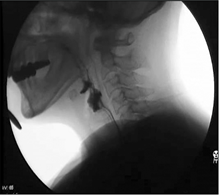Videofluoroscopy is a moving x-ray of swallowing. It is recorded onto the hospital system and onto DVD (with your consent. This enables us to view the swallow at recorded speed, slow motion or frame by frame allowing for accurate analysis and diagnosis.

What are the benefits of a Videofluoroscopy?
- Gives us detailed visual information about the swallowing muscles and their strength, function and co-ordination.
- Allows us to see if there might be any indication of/risk of food and drink going into the airway (aspiration).
- Helps us look at what foods and drinks could be easiest and safest to swallow.
- Allows us to test out if any head positions or techniques help to improve the safety of the swallow.
- Helps us to plan a more accurate therapy programme for swallow rehabilitation.
How to prepare for Videofluoroscopy and what to expect of the assessment
- The procedure will take approximately half an hour.
- You will be asked to sit on a seat next to the X-ray machine. If you use a wheelchair, you should be able to stay seated in your wheelchair for the examination.
- The Speech & Language Therapist will give you small amounts of food and drink and you will be X-rayed as you chew and swallow. The small amounts of food and fluid have radio-opaque contrast in them which show up on the X-ray.
- The Speech & Language Therapist will give you instructions and you might be given some of the fluids and/or foods more than once. If necessary, this enables better assessment of what is happening for your swallowing.
- You may be asked to alter your head position or to follow instructions to help your swallowing.
- You may be given a diagnosis and information about your swallowing during the appointment. Sometimes, further analysis is needed and you might need to see your Speech & Language Therapist at another appointment for the results.
- You may be able to watch the footage of your videofluoroscopy after the assessment has finished or later at a follow up appointment with your Speech & Language Therapist.
- A report will be sent to your GP and to your Consultant if you are seeing a Consultant. You may have a copy of your report too if you would like one.
- The recording of your videofluoroscopy will be kept by the Speech & Language Therapy Department and may be used for teaching purposes, with your name removed. Please tell us if you do not want your images to be used for training.
Can I Eat and Drink before my Videofluoroscopy?
If you are able to eat and drink, yes you can eat and drink as you usually would before the procedure. If you use a feeding tube, you will be able to continue with your feed routine as usual. There is no need to fast before a videofluoroscopy.
** Please tell us if you are allergic to any food or drink **
Do I Have to Get Undressed?
No, you do not need to remove your clothes for a videofluoroscopy. Please do not wear clothes with any metal on them such as clasps, wiring, metal zips. You will be asked to remove necklaces and/or dangly earrings so it is better to leave them at home.
If you usually chew with dentures in, please wear them.
If you use any specialist cutlery or cups, please bring them.
What are the risks?
During videofluoroscopy there is a risk that food or fluid could go down the wrong way. Care is taken to minimise this risk. If any food or fluid does go down the wrong way, we will also x-ray your lungs. Sometimes, we will call a physiotherapist who will give you exercises in the clinic to make sure the contrast is cleared before you go home.
We will take care to keep the amount of x-ray radiation to a minimum.
Occasionally, some patients may notice barium in their next stool. This is to be expected and will soon pass.
How to refer a patient for a videofluoroscopy?
A patient must have been assessed by a dysphagia trained speech and language therapist before Videofluoroscopy can be considered.
We accept referrals from our team members and from speech and language therapists in our neighbouring community teams – RDASH and Bassetlaw Community.
All referrals must be made using our videofluoroscopy referral form and sent to us via post or email. Community referral should also be agreed by the patients GP.
We usually ask that the referring therapist attends the examination, however, during the COVID-19 pandemic this rule will be relaxed due to available space for social distancing within the xray rooms.
For general enquiries about videofluoroscopy you can speak to one of our trained therapists: Kerry Turner, Natalie O’Hagan, Amanda Wallace and Jenny Hides on 01302 644218.
Content out of date? Information wrong or not clear enough? Report this page.
